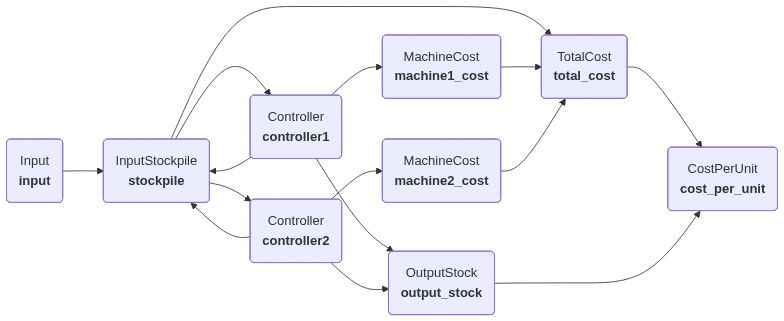Production process optimisation¶
This production line simulation models the unit cost of a small manufacturing operation with the following components:
Components:¶
- Input: Provides a fixed number of input items (10) per simulation step
- InputStockpile:
- Tracks inventory levels
- Decrements based on machine operations (Machine 1: 5 items/step, Machine 2: 8 items/step)
- Calculates storage costs ($10 per item above 50)
- Controller (2 instances):
- Controller 1: Activates Machine 1 when stockpile >= 30 items
- Controller 2: Activates Machine 2 when stockpile >= 50 items
- MachineCost (2 instances):
- Machine 1: $100 per step when running
- Machine 2: $200 per step when running
- OutputStock: Tracks total items processed by both machines
- TotalCost: Maintains running total of all costs (storage + machine operations)
- CostPerUnit: Calculates the cost per unit produced (total cost ÷ total output)
Key Metrics:¶
- Production Efficiency: Percentage of input items successfully processed
- Cost Per Unit: Total operational cost divided by units produced
- Storage Utilization: How well the system manages inventory levels
The simulation runs for 1000 steps to provide stable long-term cost metrics. We can then use the model to find optimal values for the threshold levels on the two controllers.
# Install plugboard and dependencies for Google Colab
!pip install -q plugboard[ray]
import typing as _t
from plugboard.component import Component, IOController as IO
from plugboard.schemas import ComponentArgsDict
from plugboard.connector import AsyncioConnector
from plugboard.process import LocalProcess
from plugboard.schemas import ConnectorSpec
Define the components for the model.
class Input(Component):
"""Provides a fixed number of input items per step."""
io = IO(outputs=["items"])
def __init__(
self,
items_per_step: int = 10,
total_steps: int = 1000,
**kwargs: _t.Unpack[ComponentArgsDict],
) -> None:
super().__init__(**kwargs)
self._items_per_step = items_per_step
self._total_steps = total_steps
async def step(self) -> None:
self.items = self._items_per_step
if self._total_steps > 0:
self._total_steps -= 1
else:
self.items = 0
await self.io.close()
class InputStockpile(Component):
"""Tracks input stockpile, decrements based on machine operations, and calculates storage costs."""
io = IO(
inputs=["incoming_items", "machine1_running", "machine2_running"],
outputs=["size", "storage_cost"],
)
def __init__(self, **kwargs: _t.Unpack[ComponentArgsDict]) -> None:
super().__init__(**kwargs)
self._size = 0
async def step(self) -> None:
# Add incoming items
self._size += self.incoming_items
# Remove items processed by machines
if self.machine1_running:
self._size = max(0, self._size - 5) # Machine 1 processes 5 items
if self.machine2_running:
self._size = max(0, self._size - 8) # Machine 2 processes 8 items
# Calculate storage cost: $10 per item above 50
storage_cost = max(0, self._size - 50) * 10
self.size = self._size
self.storage_cost = storage_cost
class Controller(Component):
"""Controls machine operation based on stockpile size."""
io = IO(inputs=["stockpile_size"], outputs=["should_run"])
def __init__(self, threshold: int = 30, **kwargs: _t.Unpack[ComponentArgsDict]) -> None:
super().__init__(**kwargs)
self._threshold = threshold
async def step(self) -> None:
self.should_run = self.stockpile_size >= self._threshold
class MachineCost(Component):
"""Calculates machine running costs."""
io = IO(inputs=["is_running"], outputs=["cost"])
def __init__(
self, cost_per_step: float = 100.0, **kwargs: _t.Unpack[ComponentArgsDict]
) -> None:
super().__init__(**kwargs)
self._cost_per_step = cost_per_step
async def step(self) -> None:
self.cost = self._cost_per_step if self.is_running else 0.0
class OutputStock(Component):
"""Tracks total items processed by both machines."""
io = IO(inputs=["machine1_running", "machine2_running"], outputs=["total_output"])
def __init__(self, **kwargs: _t.Unpack[ComponentArgsDict]) -> None:
super().__init__(**kwargs)
self._total = 0
async def step(self) -> None:
if self.machine1_running:
self._total += 5
if self.machine2_running:
self._total += 8
self.total_output = self._total
class TotalCost(Component):
"""Keeps running total of all costs."""
io = IO(inputs=["storage_cost", "machine1_cost", "machine2_cost"], outputs=["total_cost"])
def __init__(self, **kwargs: _t.Unpack[ComponentArgsDict]) -> None:
super().__init__(**kwargs)
self._total = 0.0
async def step(self) -> None:
step_cost = self.storage_cost + self.machine1_cost + self.machine2_cost
self._total += step_cost
self.total_cost = self._total
class CostPerUnit(Component):
"""Calculates cost per unit produced."""
io = IO(inputs=["total_cost", "total_output"], outputs=["cost_per_unit"])
async def step(self) -> None:
if self.total_output > 0:
self.cost_per_unit = self.total_cost / self.total_output
else:
self.cost_per_unit = 0.0
Now assemble into a Process and make connections between the components.
connect = lambda in_, out_: AsyncioConnector(spec=ConnectorSpec(source=in_, target=out_))
process = LocalProcess(
components=[
# Input component provides items
Input(name="input", items_per_step=10),
# Stockpile manages inventory and storage costs
# We need to include initial values here to resolve a circular graph
InputStockpile(
name="stockpile",
initial_values={"machine1_running": [False], "machine2_running": [False]},
),
# Controllers decide when machines should run
Controller(name="controller1", threshold=30), # Machine 1 threshold
Controller(name="controller2", threshold=50), # Machine 2 threshold
# Machine cost components
MachineCost(name="machine1_cost", cost_per_step=100.0),
MachineCost(name="machine2_cost", cost_per_step=200.0),
# Output tracking
OutputStock(name="output_stock"),
# Cost tracking and calculation
TotalCost(name="total_cost"),
CostPerUnit(name="cost_per_unit"),
],
connectors=[
# Input flow
connect("input.items", "stockpile.incoming_items"),
# Stockpile to controllers
connect("stockpile.size", "controller1.stockpile_size"),
connect("stockpile.size", "controller2.stockpile_size"),
# Controllers to machine costs
connect("controller1.should_run", "machine1_cost.is_running"),
connect("controller2.should_run", "machine2_cost.is_running"),
# Controllers to stockpile (for processing)
connect("controller1.should_run", "stockpile.machine1_running"),
connect("controller2.should_run", "stockpile.machine2_running"),
# Controllers to output stock
connect("controller1.should_run", "output_stock.machine1_running"),
connect("controller2.should_run", "output_stock.machine2_running"),
# All costs to total cost
connect("stockpile.storage_cost", "total_cost.storage_cost"),
connect("machine1_cost.cost", "total_cost.machine1_cost"),
connect("machine2_cost.cost", "total_cost.machine2_cost"),
# Total cost and output to cost per unit
connect("total_cost.total_cost", "cost_per_unit.total_cost"),
connect("output_stock.total_output", "cost_per_unit.total_output"),
],
)
print("Production line process created successfully!")
print(f"Process has {len(process.components)} components and {len(process.connectors)} connectors")
We can create a diagram of the process to make a visual check.
# Visualize the process flow
from plugboard.diagram import MermaidDiagram
diagram_url = MermaidDiagram.from_process(process).url
print(diagram_url)
# Run the simulation
async with process:
await process.run()
At the end of the simulation, the final cost per unit is available on the CostPerUnit component output.
final_cost = process.components["cost_per_unit"].cost_per_unit
print(f"Final cost per unit: ${final_cost:.2f}")
Now suppose we want to build an optimisation to find the best values of the threshold settings on controller1 and controller2. Specifically we want to minimise cost_per_unit by choosing the settings on the two controllers. The easiest way to do this is to convert our model to Python code with an associated YAML config file. See:
production_line.py; andproduction-line.yaml.
The easiest way to launch an optimisation job is via the CLI by running:
plugboard process tune production-line.yaml
This will use Optuna to explore the parameter space and report the controller thresholds that minimise cost per unit at the end of the run, for example:
Best parameters found:
Config: {'component.controller1.arg.threshold': 10, 'component.controller2.arg.threshold': 38} - Metrics: {'component.cost_per_unit.field.cost_per_unit': 22.491974317817014, 'timestamp': 1763499370,
'checkpoint_dir_name': None, 'done': True, 'training_iteration': 1, 'trial_id': '480ac050', 'date': '2025-11-18_20-56-10', 'time_this_iter_s': 2.0268948078155518, 'time_total_s': 2.0268948078155518, 'pid': 35181,
'hostname': 'Tobys-MacBook-Pro.local', 'node_ip': '127.0.0.1', 'config': {'component.controller1.arg.threshold': 10, 'component.controller2.arg.threshold': 38}, 'time_since_restore': 2.0268948078155518,
'iterations_since_restore': 1, 'experiment_tag': '23_component_controller1_arg_threshold=10,component_controller2_arg_threshold=38'}
